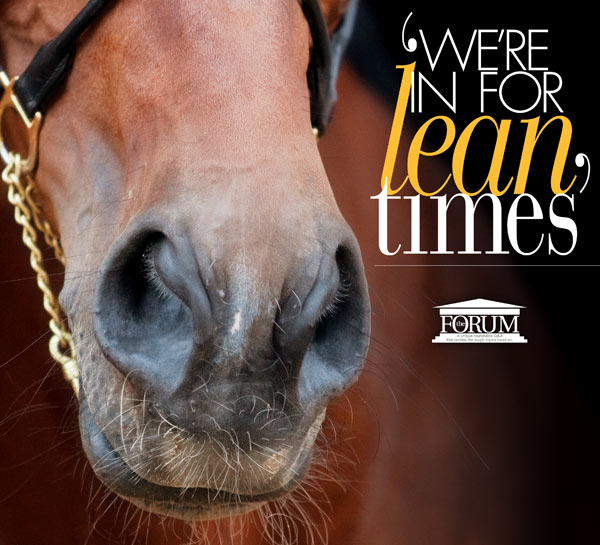
Six of Marion County’s top equestrian and business leaders sat down with Ocala Style for an in-depth interview concerning the state of Marion County’s ailing Thoroughbred industry. We discussed the alarming foaling numbers, local yearling sales, even statewide gambling initiatives. How will these issues affect our status as “The Horse Capital of the World?” Read on.
We figured the best way to get the in-the-know answers was to gather a hand-picked group of Marion County’s top equestrian and business leaders and ask them a series of tough questions face to face. In a brisk, 90-minute discussion in SKY’s well-appointed conference room on a brisk winter midday, Ocala Style Editor-In-Chief Dean Blinkhorn and Florida Horse Editor-In-Chief Mike Compton hosted a unique forum where the camera was clicking and the tape was rolling. Here’s what everyone had to say.

1. Jaye Baillie—president/CEO, Ocala/Marion County Chamber of Commerce2. Dean Blinkhorn—editor‑in‑chief, Ocala Style 3. Mike Compton—editor‑in‑chief, The Florida Horse4. Brent Fernung—president, Journeyman Stud5. Dick Hancock—executive vice president, Florida Thoroughbred Breeders & Owners Association6. Phil Matthews—veterinarian, Peterson & Smith Equine Hospital 7. J. Michael “Mike” O’Farrell Jr.—president/general manager, Ocala Stud Farm
‘A Lot Of People Owe Money’
Dean: Let’s start with this year that’s just come to a close, a very tough one for the Thoroughbred industry. What’s been happening for each of you?
Dick: If we had known what was going to happen in 2007—when people say everything began to happen—we would have slowed down a little bit. But like everybody else, we weren’t aware that this was going to happen.
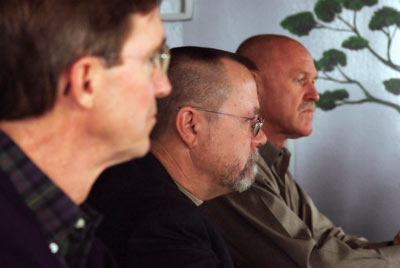 Mike O’Farrell: This is my third downturn, but it does seem different this time. In years past, the people that played in the horse business, the sport of kings, were not damaged during those downturns. This time around, wealthy people have—for one reason or another—decided not to play any longer.
Mike O’Farrell: This is my third downturn, but it does seem different this time. In years past, the people that played in the horse business, the sport of kings, were not damaged during those downturns. This time around, wealthy people have—for one reason or another—decided not to play any longer.
The other thing is how quickly it hit. In 2008, OBS [Ocala Breeders’ Sales] actually had record sales. Our two-year-old sales were stronger than they’ve ever been. A year later, it tanked.
Dean: That’s a good point. Did any of you feel like you could anticipate what was coming?
Brent: I think people largely believed that it was business as usual right up until Bear Stearns and AIG happened in September ’08 in the middle of the biggest yearling sale in the world. You could just see all the air go out of the balloon in a matter of 48 hours. They sell 350 horses a day for about 14 days in a row, but everybody just stopped.
Mike O’Farrell: The other thing is that an awful lot of people owe a significant amount of money. That wasn’t the case in the ‘70s because banks didn’t loan on horses, per se.
Phil: We have a lot of people now that really make a living in the horse industry. They’re not wealthy people; they’re day-to-day people who have invested a lot of their time, efforts, and money like any other small business owner in America. With the horse business, there’s not a huge margin of profit, so when that profit gets cut even further, it makes it tough.
Brent: In Kentucky, I would say the professional horseman is more likely to be working for a wealthy industrialist.
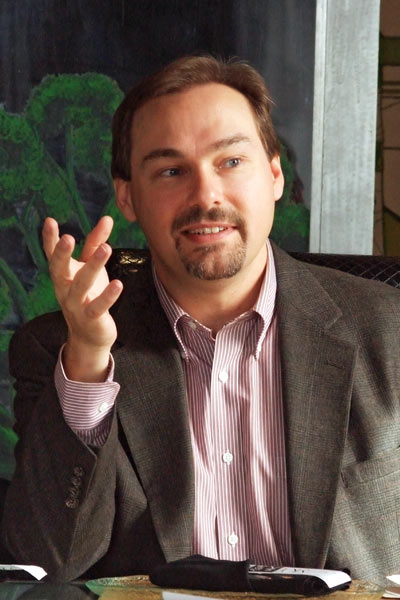 Mike O’Farrell: Well through the ‘60s, the wealthy people owned the farms and the people who knew how to take care of the horse worked for those people—the Phippses and DuPonts of the world. Starting in the ‘70s, more of the hands-on horsemen have become owners. That has made us a little more vulnerable to a downturn like we have now.
Mike O’Farrell: Well through the ‘60s, the wealthy people owned the farms and the people who knew how to take care of the horse worked for those people—the Phippses and DuPonts of the world. Starting in the ‘70s, more of the hands-on horsemen have become owners. That has made us a little more vulnerable to a downturn like we have now.
Dick: And there are more market breeders.
Mike O’Farrell: There again, through the ‘60s, the vast majority of horses produced would have never gone through a horse sale. They were bred and raised to go to the races.
Dick: If you’re not breeding for racing, your world ends at the market if you don’t have the ability to go to the racetrack financially. It’s very expensive.
‘Ocala’s Identity Is Tied To The Equine Industry’
Mike Compton: We know the industry is struggling—sales prices have declined significantly, the foal crop is down significantly. Do you see our industry getting back to where we were at its height? Or do you even think it’s necessary to get back there to be successful?
Phil: When you have diminished supply, you’re always in a better situation when demand resurfaces. Maybe I’m a naïve optimist, but the horse business has all the ability to recover and flourish again. These downturns are not new.
Brent: Owning a race horse is something that people want to do or we would’ve been out of business 50 years ago. But when you’re worried about meeting a mortgage, you’re probably not thinking too much about buying a racehorse or a new car or any other luxury item.
You’re probably looking at a two-year curve right now. The entire economy’s going to take a couple more years before it starts going the right way.
Dean: What can help the local horse industry rebound faster?
Mike O’Farrell: I don’t know whether it’s our industry that’s failing us or whether it’s the competition—the Lottery, the wagering on the Internet—but we’re definitely handling less at the track today. If you look at Calder [Casino & Race Track in Miami Gardens], their handle is probably 40 percent [of] what it was 10 years ago. Our horses, unfortunately, are only worth what they can earn. We need to find a way to get people wagering at the track.
Part of the problem is the way the money is wagered. Now people can bet with their Blackberry, but our purse structure gets no money from that.
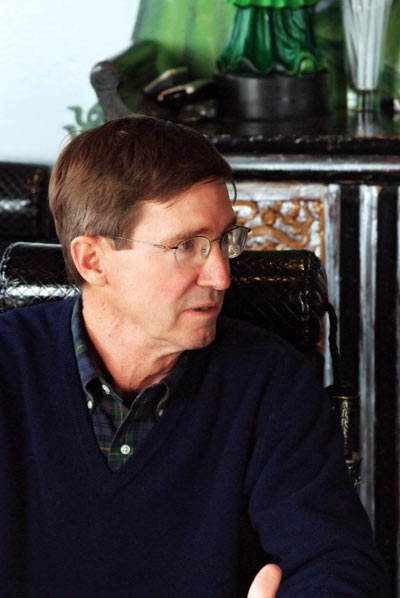
Dean: So you’re not pushing for an iPhone app anytime soon? [everyone laughs]
Dick: We have a Legislature that for the last decade has ignored Indian casinos and online wagering. They haven’t let us be competitive. We’re very fortunate to have the Speaker [Larry Cretul] doing everything he can right now. We’re not looking for subsidies; we’re looking for a level playing field.
Dean: Jaye, how has the Thoroughbred industry’s downturn affected the perception of Ocala, in terms of what you do to market Ocala as a business opportunity?
Jaye: Brent said it best. Over the last 18 months, this industry—like our small businesses, like our banks—has had to readjust its business model. The horse industry is no different. What Dick’s talking about is that they need to understand that this is a multi-billion dollar economic engine in our state economy. Just like what happened with the steel industry in Pittsburgh, though, it’s vulnerable.
FTBOA, our breeders and owners, the Chamber, and the EDC need to push that message so we don’t wake up one day and find that all of our horse farm operations have moved to other states because of incentives and because purses are higher (see sidebar).
Brent: A big part of Ocala’s identity is tied to the equine industry. If we didn’t have it, it would impact a lot more than just us personally. It would impact the real estate values and the tourist marketing.
‘Our Horse Prices Were Too High’
Mike Compton: Brent, Journeyman Stud has been as aggressive as any farm in the area in bringing new stallions and new blood to our area. Judging by your actions, you’re still very positive about Marion County. What do you see down the road?
Brent: There are only two places in the world that you have the facilities, the support, and the background to do what I do—Lexington and here. That said, I think we’re in for lean times.
Mike Compton: Mike, you’ve had the leading sire for the last handful of years. What changes have you seen at that level?
Mike O’Farrell: A couple of years ago, I felt that we were headed for some tough times. Everyone was paying slower. I’ve always found that when people have money, they’ll pay you, so that was telling.
I’m a seller, but I can tell you that our horse prices were too high. In 2008, OBS had record sales, but we actually had fewer people at those sales doing the buying.
Brent: Concentrating on a smaller group of horses, too.
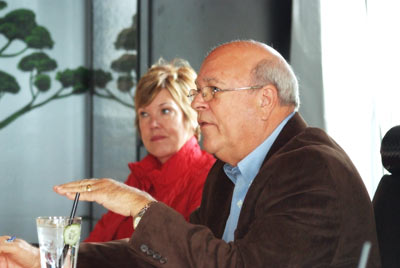 Mike O’Farrell: I actually fly out tomorrow to look at a stallion in the Northeast. Now that prices have come down, I think things will pick back up and things will be fine. Those of us who have survived this ordeal will be better off.
Mike O’Farrell: I actually fly out tomorrow to look at a stallion in the Northeast. Now that prices have come down, I think things will pick back up and things will be fine. Those of us who have survived this ordeal will be better off.
Mike Compton: What have you seen from the mare’s perspective of the local horse industry?
Phil: We’ve certainly seen the mare population drop. Unfortunately, I think the mare numbers are the biggest thing we’re seeing as far as what’s been impacted the most in the Thoroughbred industry.
Nothing feeds an economy more than the horse industry—the casinos don’t and the lottery sure as heck doesn’t. None of those industries, in my opinion, deserve the support that the horse industry does. It sells fence boards, tractors, mowers, shoes—it sells everything.
Dean: You bring up a good point because the local horse industry is our brand, but it’s also very invisible. People drive past the farms, but don’t really know what goes on. They don’t know the process…
Jaye: Or the size of the payrolls.
Dean: Right, they have no idea because they can’t be in it or around it. If Kohls or Dillards were to pull out, people would probably feel that more because they’ve been to those places.
Phil: But people do realize the beauty that those horse farms bring to this area. I think that’s something that everybody needs to think about.
Mike O’Farrell: At our farm, we had over 150 people employed, which is a good-sized business. If we locked the gates and went out of business, there wouldn’t be anybody in Ocala that would say, “Ocala Stud’s gone. Look at all the jobs we lost!” like you would with any other big company.
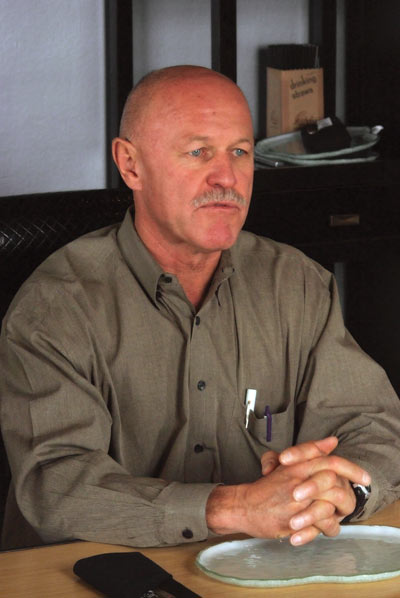 Dean: I don’t know. Ocala Stud is one of our area’s iconic farms. I think people might notice its closing.
Dean: I don’t know. Ocala Stud is one of our area’s iconic farms. I think people might notice its closing.
Mike O’Farrell: The horse business isn’t going to go away in Ocala. Unfortunately, I think it may contract some. We’re probably going to have half as many foals in 2011 as we had two years ago.
Mike Compton: Some 4,000 and change in ’07…
Brent: That’s going to put you back to 1998 levels.
Dean: Is that reversible? Or do you get to a certain point with the foaling crop that it’s very hard to come out of that?
Mike O’Farrell: Unfortunately, that’s a hard question to answer because an awful lot this time around is going to be affected by what happens with the racetracks and what happens with the Indian compact. All these issues that are going to affect South Florida are going to have an effect here as to whether or not we bounce back.
Dick: What will happen is if this legislation comes through and racing improves, people will move back down here faster.
Mike Compton: I think what Mike said was key because everything here in Marion County is geared toward success at the racetrack. We have to get the purses up.
Brent: I think it’s largely a matter of perception. If you’ve ever spent a winter chopping ice out of water buckets, you have the perfect racing opportunity in Ocala. We don’t need to match what some other state does.
Mike O’Farrell: I would put Florida up against any state, including Kentucky, as far as having the ability to produce good-quality runners. That is what’s going to keep people in the breeding business in Ocala.
‘Like A Rollercoaster’
Dean: Competition is a very good point. Certainly our readers know that we consider ourselves “The Horse Capital of the World.” We did beat Lexington to that distinction, correct?
Dick: Well, we have the trademark. [laughs]
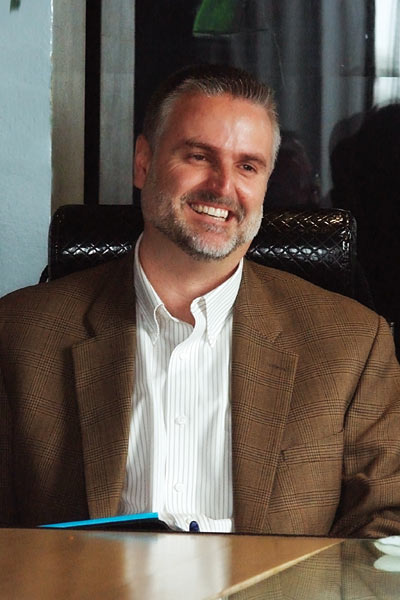 Dean: How has Lexington fared during this period?
Dean: How has Lexington fared during this period?
Brent: For the first time that I can remember, they’re scared. They’re doing everything they can to get the slots bill passed. They’re really concerned about their place as a breeding industry. In the past, they never worried about that because they had the horses, the ownership, and the money to support them.
Mike O’Farrell: I think they’re in worse shape. Their operations cost a whole lot more to maintain and operate than ours do, and their whole sales make-up is based on high-dollar horses. Ours is tied more to the two-year-old market and training. Going forward, the training end is going to carry it.
Brent: It’s a stabilizing factor.
Dick: They used to say in Kentucky, Thoroughbred racing is a social event. In Florida, it’s a timed event. You’ve got to have good horsemen. You can’t just come out here and take a shot, and I think we’ve have a lot of that kind of thing going on. We’ve lost track of breeding fast horses.
Dean: Are a lot of good horsemen still here?
Dick: Oh yeah. I would say there are more good horsemen in this county than anywhere in the world.
Mike Compton: That’s why everybody comes here to train. We have the best horsemen and horsewomen, the best soil, the best climate. This is where just about every top race horse gets its early lessons.
Phil: I like Brent’s term of “stabilizer” because, for me, when you talk about the nosedive and whether at some point you can’t pull back up, I think the training industry is what prevents that from happening. If we’re still breeding, people come down here and see their horses trained and they’re breeders themselves, a lot of them go, “Why aren’t we in Ocala?” It just continues to reintroduce the breeder to our area.
Dean: Well, that’s one of the reasons we wanted this group, people committed to this area, to get together. Just Sunday in the paper, there was a front-page article that basically wrote the obituary for the local horse industry. Was that premature?
Dick: The two things that hurt the most right now are headlines like that and banks saying they’re not going to lend money to the industry.
Dean: But perception is reality for a lot of people.
Mike: Are there going to be fewer horse farms? Yes, but that doesn’t mean our business is going to go away.
Brent: Well, those articles suggest an automobile driving off a cliff. It’s more like a rollercoaster.
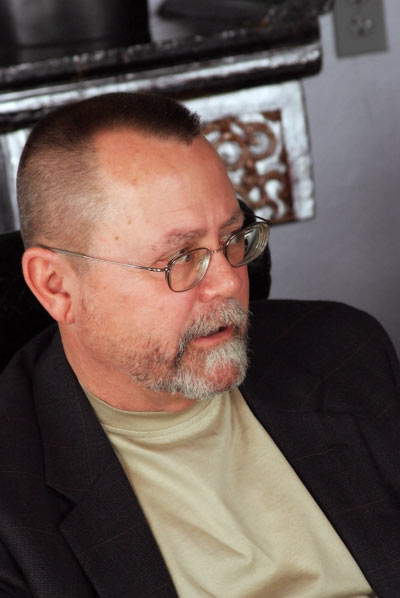 ‘A Great Time To Invest’
‘A Great Time To Invest’
Dean: Let’s talk a little about potential fixes. What are you each doing individually in your businesses over the next year?
Phil: Peterson & Smith has been in business for almost 30 years and we’re certainly invested in this area. Our plans are to weather the storm just like everybody else. It means keeping our expenses as low as we can, providing the services for as low a price as we can, not going up on any costs.
Brent: I’ve managed horse farms my whole life, so I changed the management structure on my farm. I’m now the chief cook and bottle washer. We probably made a 40 percent reduction in our payroll the last few years—some of that was related to the loss of boarding fewer broodmares.
Last year we bred 700 mares on the farm. That was probably 17, 18 percent of the total number of mares bred in the state. My goal is to increase that number. We’ve also lowered our stud fees several times in the last 18 months. What we all have to do is just keep our head down and go forward until we see that light at the end of the tunnel.
Mike O’Farrell: An awful lot of what goes on from here forward involves people making good decisions. If they’re in the breeding business, they need to make the right decisions about what type of stallion they breed to, what type of stud fee they want to invest in that stallion. I think some people get themselves in trouble with overbreeding their mares—they put too big of a stud fee into a mare that isn’t worthy, then go to the sales and lose money. A lot of them will be forced to get out of the business.
I could be wrong, but I find it a great time to invest in our industry. We recently bought a handful of broodmares. Prices have come down and that offers me the opportunity to compete with some wealthy farms.
Phil: It comes back to supply and demand. If there’s going to be half as many foals born in 2011, stud fees are lower, and the price of a new mare is lower. If you can afford to stay in the game, it may very well be an opportunity.
Dick: History has shown that it will turn around. The legislation will become law within the next four or five months, probably won’t be effective until July 1.
Mike O’Farrell: I said earlier that some folks will go out of business, and I don’t want to give the impression that we want that. Large farms cannot exist without small farms. Small farms can’t exist without large farms. We’re all in this together.
‘We’re The Equine Epicenter’
Dean: Do you see the international aspect of the business growing over time?
Dick: Absolutely. We went to Korea in 2003 to not much enthusiasm. Now they’re building an additional race track in South Korea, and they’ll be looking for 400, 500 two-year-olds in training about two years from now. We sold over $1.5 million [on] average [over] about the last three years to South Korea in the two-year-old sales.
We’ve also been successful with Ireland and England. In those countries, it’s different. South Korea is buying because they need the horses. With the other countries, we’ll just trade back and forth—when the euro or the dollar is up.
Mike O’Farrell: The Koreans probably bid on about a third of the horses sold in our April sale.
Brent: They’re huge.
Phil: They’re floating everybody’s boat a little higher.
Jaye: That’s a new revenue stream that I think is going to position us even more favorably. We have the culture and the infrastructure—our good docs, the tack stores, the food stores. We are the equine epicenter of the world.
Dick: Also, South Korea talked to us about going to China. The world’s become a lot smaller for all of us.
Dean: Are you seeing a lot of horses abandoned because people can’t care of them anymore?
Phil: When people are struggling, their animals struggle.
Brent: People don’t understand how expensive it is to own a horse. For instance, to take care of one horse, you really need to have two acres of land. Then you’re going to provide veterinary care, farrier care, and feed. It’s not like taking a cat or a dog home. People realize after they get into it just how expensive it is.
And it is a problem. Apparently, in western Kentucky, there are horses just being turned loose out on open land. I think there’s been some of that going on out here in the [Ocala National] Forest. We have to educate people about what goes into taking care of a horse.
Dick: One of the things that we’ve worked on over the years that’s paying off right now is our retirement farm for Thoroughbreds out at the prison. Through the [Florida] Department of Corrections, we take every horse that comes off the racetrack and send them through rehabilitation and into retirement. That’s been going now for seven or eight years, and it’s picking up. A lot of the horses that come out of there make pleasure horses, event horses, and even polo horses.
 Dean: Any final thoughts?
Dean: Any final thoughts?
Jaye: There’s an inordinate amount of pride in this community toward the horse industry. We need to help on a county, state, and federal level of working with businesses so that it’s favorable for the horses to be bred and raised here in Florida. I don’t think our policymakers necessarily understand the big picture.
Brent: I got here in 1976, so I’m totally committed to the industry. I want to do whatever we can do to be a positive force. Any commitment we can get internationally—like South Korea—will be huge for us. If we can make people understand just how important this industry is to Ocala/Marion County, if we can get those people behind us and let them start rattling a few cages up there in Tallahassee, it would be huge.





